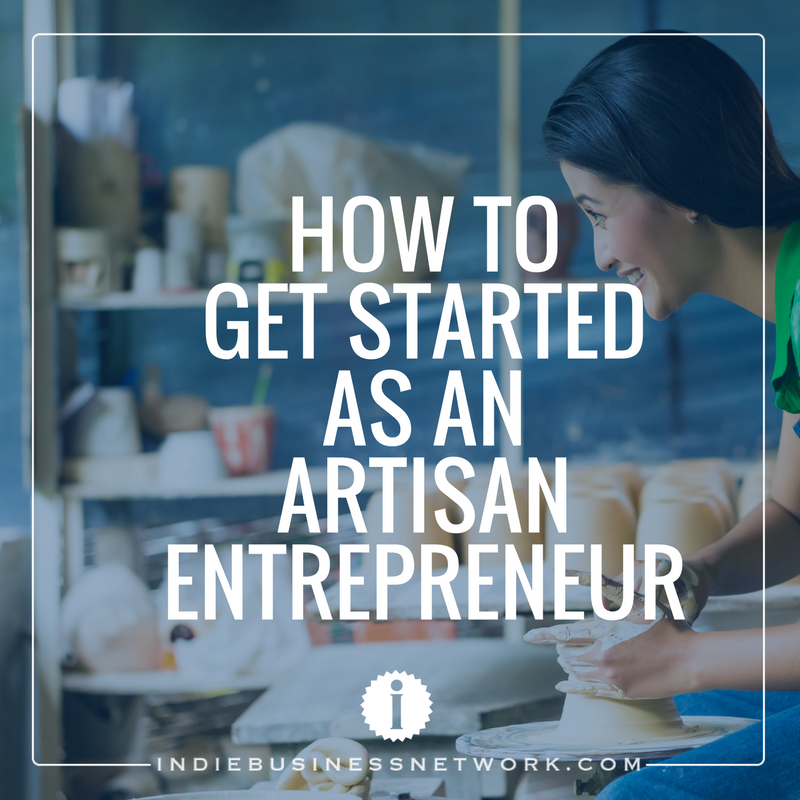Each week, I receive countless emails and phone calls from people who want to launch a business selling the products they make. I received an email recently from Jill in Tennessee who told me that: “I am really having a hard time finding what makes me unique. Therefore, I am having a hard time defining my target market.”

Jill is not alone. Her question is part of a much larger series of questions that all entrepreneurs must ask and answer — and then act on — in order to be successful. To help Jill and others like her (maybe you?), here is an overview of the important activities you must engage in to get started as an Artisan Entrepreneur.
First, let’s look at a few of the reasons people tell me they want to start an artisan business at all. Entrepreneurship is a great way to:
- create an asset that increases in value over time
- make money doing something you enjoy doing and have a deep passion for
- transform your gifts, talents, and special skills into a sustainable income
- develop yourself personally as you improve your leadership skills and increase your overall value to the market place
- expand your sphere of influence as a community and industry leader
Everyone has a different set of reasons for wanting to own a business. I started my business in 2000 shortly before I married and a few years before giving birth to our first child. As a mom and homemaker, my biggest reason to pursue entrepreneurship was (and continues to be) to financially support myself and my family while also enjoying the freedom to be available to my children on my own terms.
But how do you get started? Here are the ten steps I recommend right out of the box.
How to Get Started as an Artisan Entrepreneur
- Make a critical mindset shift
You must shift your mindset from wanting only to do what you love, to wanting what you love to love you back — in the form of financial reward. Let me explain.
A hobby, which is where many Artisan Entrepreneur businesses have their roots, is something you love to do. It serves as a creative and social outlet that is also relaxing. If you grow tired of it, you can switch to a new hobby.
A business is different. While it too should be a social and creative outlet, it's not always relaxing. You must manage your business whether or not you feel like it.
A business has to also love you back, meaning it has to produce more money than it costs. You don't have to worry about that with a hobby.
The mindset shift is from “Gee, it's fun to do what I love all day,” to “Gee, I'd better finish up what I love doing so I can sell it and generate the income needed to make this business pay for itself and then some.” You must embrace both elements of entrepreneurship as early as possible in the process in order to be successful.
- Plan on selling a product people want to buy
Look for what I call the “white space” in the market. Don't just make great perfume. Make great perfume that a certain segment of the population values enough to buy. Perhaps adventurous males need a fragrance that captures the essence of the great outdoors, but the ones on the market are not packaged in a way that allows them to take them on camping trips. Maybe women of a certain age need jewelry that celebrates their passage into a new phase of life, but they have not been able to find a brand that caters to them. What hole in the market will your product fill?
Avoid the kiss of death for any business: trying to be all things to all people. Maintain a manageable product line. Keep things simple, especially as you start up, so you don't stretch yourself too thin.
“
”
Donna Maria, Indie Business Network - Create, plan and solidify a vision for your business
Identify a long-term vision for your business. Without one, you'll be plugging along making general progress, but going nowhere in particular.
What do you want your business to do and be in five years? How about 10 years? Do you want to sell it someday? Or will you plan to just close it down when you decide you don't want to run it anymore? (Yes, that day will come.) These things must be planned in advance, along with every other important factor in your business. Here is an article to help you create a sustainable vision for your business.
- Create and clarify your brand message
Will your message to your target market be that your product will save them time or money? Will it be that your product will make them feel better about themselves? Is it that they deserve to celebrate an important milestone in their lives, and your product helps them do that? Is your message one of health and fitness? Simplicity? Spirituality? Fun?
You cannot be vague here. Your message has to be specific and clear enough for people to understand quickly and accurately exactly what you offer and how it will benefit your target audience.
Your products should tell a story that resonates with the people who are most likely to purchase what you have to offer.
If you already have an idea of your message, use a survey tool like Survey Monkey to test and clarify it. Ask questions of people you think would be interested in a product like the one you would like to create. Use their feedback to create and strengthen a message that forms the platform upon which your product can comfortably rest.
“
”
Donna Maria, Indie Business Network - Prepare your products for sale
Make sure your packaging is sturdy and appropriate for your product and your target audience. Make sure things are labeled in compliance with whatever laws you have to follow in your industry. (Here is an overview of the laws you need to be aware of if you make and sell soaps, cosmetics, and other types cosmetics.) Take clear, high quality product photos.
- Price your products to make your business profitable
No matter what else you do, if your products are not priced to make a profit, your business will fail. There are lots of tools available to help you set your prices, among them Price-O-Matic and this free “plug and play” pricing calculator.
- Obtain trademark protection for your brand
To avoid infringing on someone else's intellectual property rights, make sure no one else is already using the brand name you want to use to identify your products. If you find that someone else is using the name you want to use, especially if they are in your industry, choose another name. Learn more about how to obtain trademark registration here.
- Establish a social media presence
Using social media will help you reach your target audience faster than just about anything else. It's also a public display of your brand and your message to the world. Social media gives your brand legs. The more you use social media to share what you are doing, the more visible your products will become. Setup social media outlets that correspond to your brand name. Here are some reasons to set up your social media before your business actually launches.
- Create your sales platform(s)
This can be anything from a website to a trade show or a recurring local market — or all of the above.
You can use a platform like Etsy or Amazon or Amazon Handmade, or you can set up your own branded website with ecommerce capabilities. Each of these platforms has its own pros and cons so you'll want to choose the one that will work best for you and your product.
To set up your own branded website, try a company like Shopify or Big Commerce. Both cater to product-based businesses and have strong points that will help you be successful.
- Develop your policies and contracts
Make your policies clear at your website. Can customers return your products or are all sales final? Is there a restocking fee? What are your wholesale policies? Do you donate funds or products to non-profit organizations or causes you care about? What if a customer's order is damaged during shipment? Do you replace it? What is your legal policy? What is your privacy policy?
If you’ve been thinking about starting a business selling the products you make, these steps will help you lay a solid foundation from the very beginning. You don't have to have everything all lined up perfectly before you begin. (That will never happen so matter how hard you try.)
You can tweak things as you go. The important thing is not to sit on your dream, but to take action to make it come true.
Need More Support?
If you need assistance launching your artisan business, help you need is just a click away with Indie Business University, your Success Path to a sustainable and profitable business.
Question
Do you have an artisan business? What other steps would you recommend? Which of the above steps do you think is most important? What are your questions? If you are inspired by the information here, feel free to share in the comments below, or share on Facebook, Twitter, and LinkedIn.



